
2021 | MAINEHEALTH CANCER CARE NETWORK
OUTCOMES REPORT

FRANKLIN COMMUNITY HEALTH NETWORK, FARMINGTON LINCOLNHEALTH, DAMARISCOTTA WA L D O C O UN T Y G EN ER A L H O SP I TA L , B E L FAS T P E N B AY MED ICA L C E NT E R , RO C K P O R T MID COAST HOSPITAL, BRUNSWICK M A I N E M E DI CA L CEN T E R , P OR T L A N D SOUTHERN MAINE HEALTH CARE, BIDDEFORD WESTERN MAINE HEALTH, NORWAY ME M ORI A L H O S P I TA L , N OR T H C O N WAY, N H M A I N E G E N ER A L MEDI C A L C E NT E R HAROLD ALFOND CENTER FOR CANCER CARE, A U G US TA S T. MA R Y ’ S R E G IO NA L ME D I CA L C E NT E R , L E W I S T O N NETWORK PARTNERS
Throughout Maine and the Mt. Washington Valley in New Hampshire, cancer patients have access to state-of-theart, coordinated cancer care. The MaineHealth Cancer Care Network is designed to reduce the need for travel whenever possible by connecting cancer patients with cancer experts. Our network is the largest in northern New England, which provides greater access to cancer care specialists who focus on the specific needs of our patients. Plus, we treat the most cancer cases in the region, which demonstrates a level of experience that patients and families can trust. ON THE COVER:
 Vatche Tchekmedyian, MD, MaineHealth Cancer Care Network oncologist, says the network offers cutting-edge cancer treatments to patients in Maine and New Hampshire, along with innovative clinical trials so that patients may have the option to pursue these treatments when needed. He is a hematologist-oncologist with subspecialty training in the treatment of head and neck cancers.
Vatche Tchekmedyian, MD, MaineHealth Cancer Care Network oncologist, says the network offers cutting-edge cancer treatments to patients in Maine and New Hampshire, along with innovative clinical trials so that patients may have the option to pursue these treatments when needed. He is a hematologist-oncologist with subspecialty training in the treatment of head and neck cancers.
1 2 ����������������������������������������������������������������������������������������������������������������������� Introduction 3 ����������������������������������������������������������������������������������������������������������� Care Rooted in Trust 4-9 ��������������������������������������������������������������������������������������������������������������� Outcomes Data 5 Newly Diagnosed Cancer Cases — Analytic Volume 5 ......................................................................................................................... Cancer Cases by Body System 6-7 Top 5 Body System Type by Hospital 8-9 .................................................................................................................. Patient Navigation & Screenings 9 Cases Discussed in Network Tumor Boards 10 ����������������������������������������������������������������������������������������������������������� Facilities Expansion 11-12 ������������������������������������������������������������������������������������������� Clinical Trials and NCORP 12 ............................................................................................................................ Interventional Trial Accrual 12 NCORP Accrual 13-16 ������������������������������������������������������������������������������������������������������ Network Milestones 13 Telehealth Expands 13 ........................................................................................................... Survivorship Care Plans Support Care 13 Patient Education Increases 14 Shared Decision-making Features Nodule Model 14 Breast Care Innovations Support Patients 15 Study Leads to Increased Patient Engagement 16 ........................................................................................................................ Innovations in a Rural Setting TABLE OF CONTENTS
As the pandemic unfolded in early 2020, the MaineHealth Cancer Care Network stood ready to serve our communities. And, our patients have remained our top priority. We thank those care team members who volunteered and others who welcomed new or additional duties beyond their usual roles — including our screeners, greeters and administrative staff assisting with infusion and vaccination sites. Throughout 2020 and 2021, investing in our people, technology and innovation has enabled the MaineHealth Cancer Care Network to provide cancer care to our patients during these challenging times. Although we experienced decreases in screening, elective surgery and downstream volume, the number of patients under active medical oncology or radiation oncology treatment did not decrease. In addition, clinics remained fully operational, newly diagnosed patients were treated following enhanced safety protocols, and we implemented telemedicine alternatives and options when appropriate.
Maine and New Hampshire cancer patients and their families desire state-of-the-art, patient-centered care. Our singular goal is to ensure that “the right care, in the right location, as close to home as possible” will be provided. Many of our physicians have achieved the highest level of training in their fields, bring together experts in medical oncology, radiation oncology and surgical oncology with peers in radiology, pathology, palliative care, oncology nursing, pharmacy and patient navigation. Our teams evaluate each patient’s case and develop an evidencebased treatment plan. Importantly, we then discuss the recommended plan with the patient and engage in a shared decision-making process that honors their values and preferences.
While it has been a year like no other, we welcome the opportunity to partner with you to care for your patients with cancer, and I hope this report will give you confidence in the quality of care the MaineHealth Cancer Care Network offers.
Scot C. Remick, MD, FACP Chief of Oncology MaineHealth Cancer Care Network and Maine Medical Center


2
LUNG CANCER DOESN’T WAIT. NEITHER SHOULD YOU. IT’S WHY WE’VE BUILT THE LARGEST CANCER CARE NETWORK IN THE STATE. Each year, our state sees far more lung cancer cases than any other type of cancer. Although that’s alarming, it’s not without hope. Screening is an effective way to detect cancer early, giving you more time and options in your treatment. Because when it comes to cancer, nothing is more valuable than time. With the largest cancer care network in the state, MaineHealth can help keep you focused on your future. If you suspect you or a loved one is at risk for lung cancer, it’s a good time to start a conversation with your doctor. SPECIALISTS IN MAKING YOU FEEL SPECIAL. mainehealth.org/lungcancerscreening Print ad promoting the importance of screening
INTRODUCTION
CARE ROOTED IN TRUST
Margaret McBreairty, a metastatic breast cancer patient from Allagash, Maine, traveled between six and seven hours one way and back for care and treatment at MaineHealth Cancer Care in South Portland. Margaret explained she traveled the distance for a reason — “the care team knows what they are doing, are so careful and professional, and they all care so much.”
“The coronavirus pandemic has changed how we provided care, but the reason why has stayed the same – we are committed to providing patients with the highest quality cancer care,” said Christina Stone, a member of Margaret’s care team. “When we first started screening at the beginning of the pandemic, Margaret actually got teary when she came in because she was so happy to see how we were handling things.”
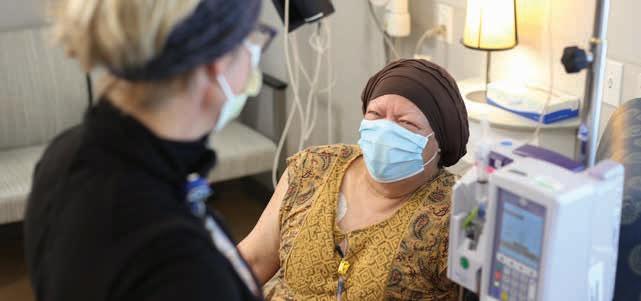
Margaret is a patient of medical oncologist Roger Inhorn, MD, Ph.D. She said having a relationship with her care provider that is grounded in trust has made the difference for her. “I know I’m getting better and have made progress.”
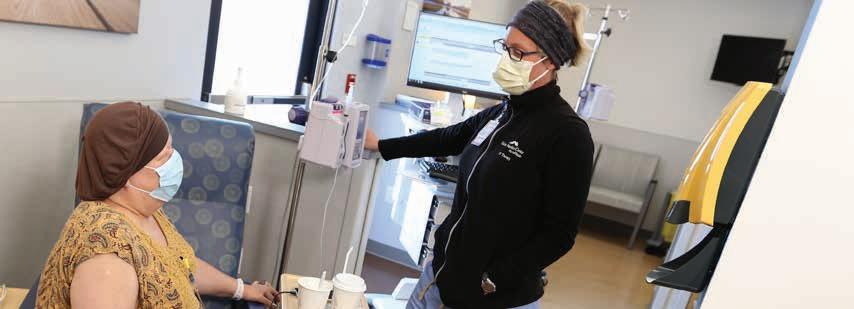
3
Jennifer Roy, RN, chats with breast cancer patient Margaret McBreairty
OUTCOMES DATA
Our goal is to provide patients with excellent multidisciplinary, team-based care in an accredited comprehensive cancer program, served seamlessly and as close to home as possible, with outcomes that match or exceed national benchmarks. The network is accredited with the American College of Surgeons (ACoS) Commission on Cancer (CoC) and The National Accreditation program for Breast Centers (NAPBC). Applying for and maintaining CoC and NAPBC approval is a voluntary pledge by a cancer program to ensure quality care for its patients.
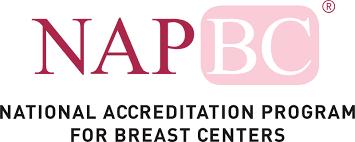
The Cancer Registry works collaboratively with the network’s cancer committee to maintain CoC accreditation. The standards required for accreditation cover a broad range of activities including the setting of annual programmatic and quality goals, community-based prevention and screening programs and lifetime follow-up of patients.
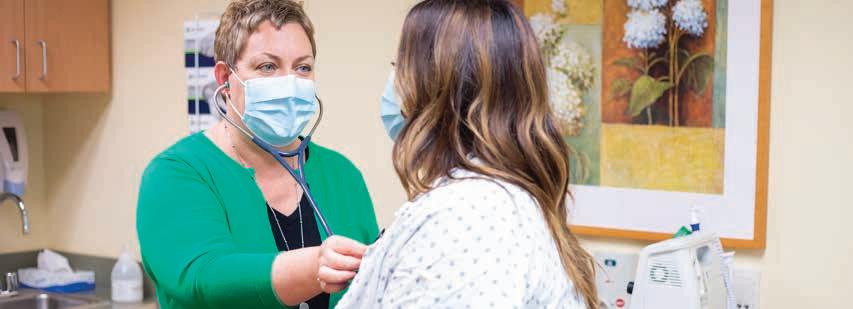
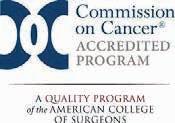
Our focus is on improving quality to exceed all national benchmarks in different aspects of cancer care and treatment in the areas that we currently service. We would like to focus our efforts on achieving accreditation with the Quality Oncology Practice Initiative (QOPI), a program run by The American Society of Clinical Oncology (ASCO). It is designed for outpatient oncology practices to measure quality by looking at processes of care while showing commitment to excellence and adherence to evidenced-based guidelines.
Evie Taylor MHA, BSN, RN OCN Senior Director of Quality MaineHealth Cancer Care Network and Maine Medical Center
4
Rebecca Eisenberg, MD checks on a patient at MaineHealth Cancer Care in Sanford
NEWLY DIAGNOSED CANCER CASES — ANALYTIC VOLUME
Our network continues to treat the majority of new cancer cases in northern New England. Data used in this report summary represents the MaineHealth Cancer Care Network as of July 31, 2021.
With the pandemic, the number of new diagnosed cancer cases in 2020 dropped to 5,477, and the total number of shared cases was 667.
CANCER CASES BY BODY SYSTEM
Facilities included: MMC, SMHC, Maine General Medical Center, Mid Coast Hospital, St. Mary’s Regional Medical Center, Pen Bay Medical Center, Stephens Memorial Hospital, Waldo County General Hospital, Franklin Memorial Hospital, Miles Memorial Hospital and Memorial Hospital. Year 1st Contact Year, 2015-2019.
5
2015 BASELINE 2016 ACTUAL 2017 ACTUAL 2018 ACTUAL 2019 ACTUAL 5,988 6,067 6,257 6,590 7,074
6
HOSPITAL
FRANKLIN MEMORIAL HOSPITAL % Cases MALE GENITAL SYSTEM 19% BREAST 17% DIGESTIVE SYSTEM 15% URINARY SYSTEM 11% SKIN 11% MID COAST HOSPITAL % Cases BREAST 20% MALE GENITAL SYSTEM 19% DIGESTIVE SYSTEM 16% URINARY SYSTEM 13% RESPIRATORY SYSTEM 8% MAINE MEDICAL CENTER % Cases BREAST 17% DIGESTIVE SYSTEM 16% RESPIRATORY SYSTEM 12% FEMALE GENITAL SYSTEM 12% MALE GENITAL SYSTEM 11% MAINEGENERAL MEDICAL CENTER % Cases RESPIRATORY SYSTEM 22% DIGESTIVE SYSTEM 16% BREAST 15% MALE GENITAL SYSTEM 10% URINARY SYSTEM 7% MILES MEMORIAL % Cases BREAST 39% DIGESTIVE SYSTEM 25% FEMALE GENITAL SYSTEM 14% SKIN 7% ORAL CAVITY & PHARYNX 4% MEMORIAL HOSPITAL % Cases MALE GENITAL SYSTEM 22% URINARY SYSTEM 17% BREAST 13% DIGESTIVE SYSTEM 12% RESPIRATORY SYSTEM 7%
TOP 5 BODY SYSTEM TYPE BY
(AS OF AUGUST 2021)
7
PEN BAY MEDICAL CENTER % Cases MALE GENITAL SYSTEM 20% DIGESTIVE SYSTEM 17% BREAST 13% URINARY SYSTEM 13% RESPIRATORY SYSTEM 10% SOUTHERN MAINE HEALTH CARE % Cases BREAST 23% DIGESTIVE SYSTEM 17% RESPIRATORY SYSTEM 15% MALE GENITAL SYSTEM 13% URINARY SYSTEM 12% WALDO COUNTY GENERAL HOSPITAL % Cases BREAST 26% RESPIRATORY SYSTEM 15% DIGESTIVE SYSTEM 15% URINARY SYSTEM 9% FEMALE GENITAL SYSTEM 8% ST MARY’S REGIONAL MEDICAL CENTER % Cases RESPIRATORY SYSTEM 20% MALE GENITAL SYSTEM 19% DIGESTIVE SYSTEM 16% URINARY SYSTEM 13% FEMALE GENITAL SYSTEM 8% STEPHENS MEMORIAL HOSPITAL % Cases BREAST 26% DIGESTIVE SYSTEM 19% RESPIRATORY SYSTEM 13% FEMALE GENITAL SYSTEM 7% BRAIN & OTHER CNS 7%
TOP 5 BODY SYSTEM TYPE BY HOSPITAL (AS OF AUGUST 2020) CONTINUED
PATIENT NAVIGATION & SCREENINGS
Considering the broader impact of the pandemic, the network team continued to meet the needs of our patients and communities.
PATIENT NAVIGATION
Patient navigation is individualized care offered to manage complexities associated with a cancer diagnosis and facilitate timely access to care and shared decision making. Our patient navigators facilitate care transitions for medical oncology, radiation oncology, gastro oncology, plastic surgery, urology, genetics, pulmonary and palliative care, along with support services of social workers and community resources.
Dan Filitis, MD, dermatologist and Mohs surgeon from MaineGeneral, a member of the MaineHealth Cancer Care Network, performs a patient screening for skin cancer.
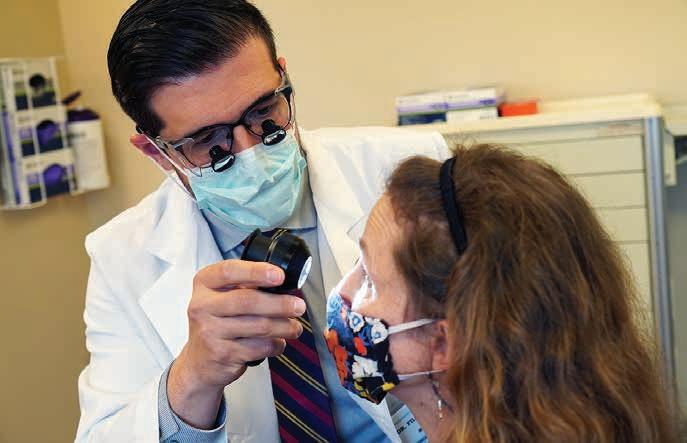
8
PATIENT NAVIGATION & SCREENINGS
Tumor boards are multidisciplinary meetings where complex and new patient cases are discussed in significant detail. MaineHealth concentrates on patients with challenging tumors and patients who have previously received treatment and, for a variety of reasons, now need a different treatment plan.
During 2020, there were 13 tumor board/cancer conferences and 1,541 prospective cases presented.
9
CONTINUED
CASES DISCUSSED IN NETWORK TUMOR BOARDS 2016 2017 2018 2019 LUNG SCREENING (BASELINE SCREENINGS, DOES NOT INCLUDE FOLLOW-UP SCANS) 139 192 232 354 COLORECTAL SCREENING (PERCENT OF ELIGIBLE PATIENTS SCREENED) 64.5% 73.4% 76.9% 78.87% 2017 2018 2019 3,815 3,916 4,066 % OF PATIENTS SCREENED (2019) PATIENT EDUCATION 84% SCREENED FOR CLINICAL TRIALS 58% SCREENED FOR TOBACCO CESSATION 62%
SCREENINGS
FACILITIES EXPANSION
In 2021, U.S. News & World Report named Maine Medical Center (MMC) a “Best Regional Hospital” for the ninth consecutive year. MMC also was recognized as “high performing” in 13 common procedures and conditions, including colon and lung cancer surgery.

Maine Medical Center opened two new floors dedicated to oncology atop the hospital’s Coulombe Family Tower, a major milestone in its 2020 $534 million expansion and modernization project. The Susan Donnell Konkel Pavilion for Surgical Oncology and the Marshall L. and Susan Gibson Pavilion for Medical Oncology include 64 single, universal rooms where patients receive state-of-the-art cancer care in a private setting. MMC is an academic health center that serves as the flagship of MaineHealth integrated delivery system in southern and central Maine and eastern New Hampshire.
Other hospitals in the network continued to expand and renovate for cancer care, including Southern Maine Health Care’s Sanford Campus, Waldo County General Hospital, Pen Bay Medical Center, LincolnHealth’s Herbert and Roberta Watson Health Center and Western Maine Health’s Stephens Memorial Hospital.
INNOVATIONS IN CANCER CARE
Watch our video update at mainehealth.org/Cancer/Provider-Resources/Innovations

10
Page header photo copyright Anton Grassl, Courtesy of Perkins and Will
Johnson Liu, MD is a medical oncology and hematologist at MaineHealth Cancer Care. Dr. Liu was also a medical and hematology fellow and investigator at the National Institutes of Health, Bethesda.
CLINICAL TRIALS AND NCORP
MaineHealth Cancer Care Network was awarded a six-year $5.1 million dollar grant to join the NCI Community Oncology Program (NCORP) in 2019. Today, this grant spans the spectrum of the cancer care continuum from prevention, screening, therapeutic, quality-of-life, to end-of-life and cancer care delivery research.
• In its second year, the transformation NCI award continues to be foundational to our network research efforts that have included competitive supplements to join the high priority NCI Cancer MoonshotSM Biobank Study and an investigator-initiated SARS-CoV-2 antibody period seroprevalence study throughout the cancer care workforce.

• Over the past year, the MaineHealth Cancer Care Network clearly established a trajectory that has enormous potential to raise the bar on patient-centered cancer care in Maine. The NCORP support for oncology research program has been vital in helping MaineHealth create additional infrastructure to support research initiatives throughout the network.
According to Scot Remick, MD, chief of oncology, MaineHealth Cancer Care Network and Maine Medical Center, cancer patients often feel that to get state-of-the-art care and to enroll in clinical trials they need to travel to a major metropolitan area. Today our patients have access to advanced care close to home — wherever they live. The number of clinical trials available to oncology patients in the network is expected to nearly triple over the next five years.
Our clinical trials are research studies that help us find better treatments and ways to prevent cancer and other diseases. Even during the pandemic, the number of patients in the trials grew from 513 in 2019 to 597 in 2020.
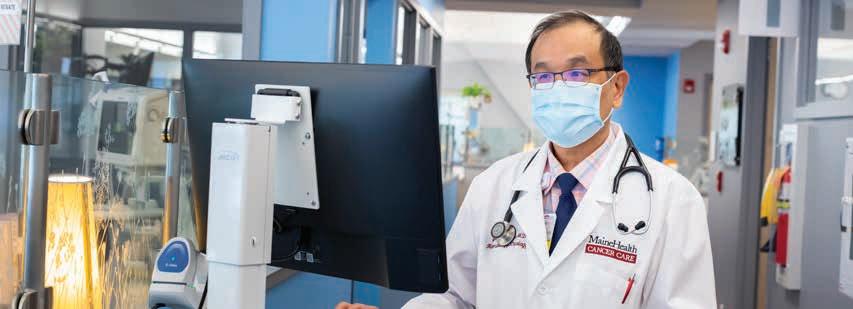
11
MaineHealth is part of the prestigious NCI Community Oncology Research Program.
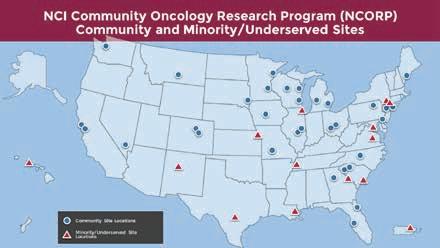
Source: Community oncology and prevention trials research group, Division of Cancer Prevention, NCORP, 2019
Accrual — patient enrollments to base intervention (Standard or HP), advanced imaging, quality of life in treatment trials, and select other study components
Biospecimen — specimen(s) collection completed
Special Entries — any patient enrollments not belonging to one of the two categories described above
12 INTERVENTIONAL TRIAL ACCRUAL — 1/1/20 TO 12/31/20 MAINE CANCER GENOMICS INITIATIVE NATIONAL CANCER INSTITUTE HEALTH CARE WORKERS SEROPREVALENCE ACCRUAL MAINE CHILDREN’S CANCER PROGRAM OTHER TRIALS TOTAL 197 164 159 31 46 597 NCORP ACCRUAL — 8/1/20 TO 6/30/21 (YEAR 2) TRIALS ACCRUAL BIOSPECIMEN / SPECIAL ENTRIES 197 164
NETWORK MILESTONES
TELEHEALTH EXPANDS
The MMC Cancer Risk and Prevention Clinic transferred its entire practice to telehealth over the past year. Genetic counseling lent itself very well to this model, and we were able to connect with patients in their homes. Connecting by telehealth has also saved patients’ travel since there are not many genetics clinics in the state of Maine, and some patients had long drives. This increased accessibility was well received by patients and providers alike. We are were able to facilitate genetic testing for patients in their homes too. Several of the genetic testing labs sent saliva collection kits directly to patients in their homes. This expanded options for patients and without the need of a visit to a clinic for an appointment or blood work.
SURVIVORSHIP CARE PLANS SUPPORT CARE
Survivorship begins as soon as a diagnosis of cancer is made. Any person with a history of cancer is considered a cancer survivor from the time of diagnosis through the balance of life, and includes living with, through and beyond a cancer diagnosis. Building upon a successful launch, the network’s grant-funded survivorship care plan program had a successful third year. Additional disease site-specific plans were created and implemented, for a total of 15 electronic plans, including melanoma, leukemia/lymphoma and head/neck.
PATIENT EDUCATION INCREASES
Providing patient with education about their diagnosis, treatment and recovery is an important component of cancer care. The network has a goal of standardizing patient education messages across the network, which helps reduce confusion for patients and supports seamless transitions in care. The standardization of patient education can occur at the practice, region or network level. Regardless of the size of the system, the vision for patient education across the network is to ensure we provide high-quality patient education. In addition, patients benefit when they receive the same messages or instructions from all members of their extended cancer care team.

13
Members of the MMC Breast Care Center team gathered to celebrate the 25th anniversary of the center opening at 100 Campus Drive in Scarborough.
Pictured are left to right are Karen Phelps, APN; Cassandra Marcisso, APN; Paige Teller, MD; Jillian Smith, MD; Lynn Reid, APN; Elizabeth DesJardin, MD; and Patricia Greatorex, MD.
SHARED DECISION-MAKING FEATURES NODULE MODEL
In 2020, the network presented a concept using a 3D lung nodule educational tool to use during shared decisionmaking discussions with patients undergoing 3D low-dose CT scan lung cancer screening. In this manner, we hope patient distress following an incidental finding of pulmonary nodule(s) can be favorably affected using this model. Theresa Roelke, ANP, invented the 3D lung nodule model and participated in a collaborative research study for screening protocol. Roelke was awarded an Association of Community Cancer Centers’ Innovator Award and an United States patent application was filed.
BREAST CARE INNOVATIONS SUPPORT PATIENTS
Maine Medical Center’s Breast Care Center introduced an innovative procedure, called magnetic seed localization, which improves breast cancer patient’s surgical experience. Magnetic seed localization is a technique used to mark a lesion in the breast prior to surgery when the lesion is not palpable. It will be offered at multiple MaineHealth sites in the future. Magseed, a tiny, sterile magnet the size of a grain of rice, can be inserted with the assistance of image guidance prior to surgery. During the surgery, the surgeon uses a magnetic wand to locate the lesion that needs to be removed.
According to Paige Teller, MD, breast surgeon and director of the Breast Care Center in Scarborough, this process will replace the tumor-marking methods of radioactive seed and wire localization which was done institutionally for many years. Magnetic seed localization allows for greater flexibility in scheduling and allows for more consistency in technique regardless of where a patient may have surgery. “The Magseed is more comfortable for the patient than wire localization and offers greater scheduling convenience than prior wire or radioactive seed localization.” said Dr. Teller.
For patient safety, radiologic technologist Mikki Rooney disinfects mammography equipment at MMC’s Breast Care Center, Scarborough.
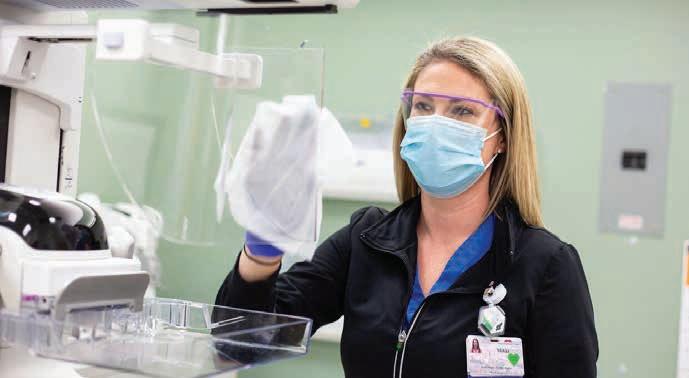
14
STUDY LEADS TO INCREASED PATIENT ENGAGEMENT
In early 2020, MaineHealth completed year one as a participant in the five-year NCI-funded, quality improvement grant study, called Moonshot. Epic was engaged to develop a Patient Reported Outcome (PRO) or Electronic Symptom Management solution (eSyM) and developed a process and workflow for tracking eligible patients beginning infusion therapy, sending questionnaires to patients and receiving results and notifications to clinicians and providers.
The MaineHealth Cancer Care Network joined five other health systems in the SIMPRO initiative as part of the NCI grant. Over the course of the five-year study, each health system follows an alternating project schedule of implementing eSyM in the medical oncology and surgical oncology specialties. When the pandemic started, MaineHeath went live with the study in five of its medical oncology locations. While there was modest growth in the number of patients enrolled and participating, there was an increase in overall active MyChart patients in medical oncology. The overall active MyChart average was 70%, up from 60% at the beginning of the grant study in 2019. The severe symptom rate, averaging over 20% of the PROs, was also considerably higher than the expected 2% from research prior to the beginning of the study. The general consensus across the test sites during the pandemic was that the tool has proven to be an alternative method of remotely engaging in patient care.
Jessica Bian, MD, the principal investigator for the study, advised focusing on the rate of patient engagement or growth in patient participation overall — which required fewer emergency room visits, and reported better quality of life.
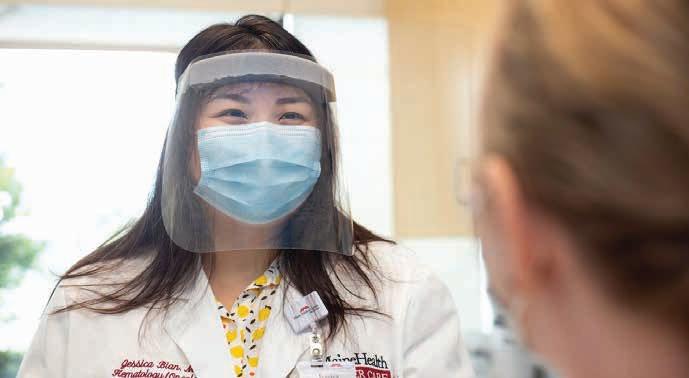
15
INNOVATIONS IN A RURAL SETTING
According to Peter Rubin, MD, medical oncologist with the MaineHealth Cancer Care Network, cancer patients often feel that to get state-of-the-art care, they need to travel to a major metropolitan area. One of the top priorities at MaineHealth is that care be provided as close to home as possible for patients, who must often travel for specialty care in Maine and New Hampshire.
The staff at Stephens Memorial Hospital was pleased to offer a cutting-edge treatment in Western Maine. The infusion team recently treated their first patient with an FDA-approved personalized immunotherapy proven to extend the life of men with a certain type of prostate cancer –— a cancer which has spread to other areas of the body and is resistant to hormone deprivation therapy. The treatment process included three personalized cycles using the patient’s immune cells, which have been activated to empower his immune system to fight the cancer. A dedicated group comprised of Dr. Rubin, an oncology nurse practitioner, nurse navigator, infusion, and pharmacy team members worked tirelessly to develop the process to provide this unique medication at the rural site.
NETWORK SUPPLIES COMPREHENSIVE TREATMENT

Patient Miranda Benefield underwent a colonoscopy at Pen Bay Medical Center (PBMC) in Rockport. When her screening discovered a cancerous tumor, it was the start of a long journey back to health. Fortunately, that journey was eased by the seamless care provided by the MaineHealth Cancer Care Network. Miranda had surgery to remove the tumor at Maine Medical Center in Portland, worked with cancer care specialists at PBMC and Waldo County General Hospital to determine post-surgery treatment and received infusion therapy and chemotherapy treatments at the Harold Alfond Center for Cancer in Augusta.
“It’s so important for people to know how important it is to receive care as close to home as possible when you’re battling cancer, and that MaineHealth Cancer Care Network provided that for me,” Miranda said. “It allowed me as a patient to focus on treatment and recovery.” Today, Miranda, a single mother of two, has finished treatments and has received a clean bill of health. “Early detection saved my life,” Miranda said.
16
The MaineHealth Cancer Care Network is committed to knowledge sharing and the ongoing discussion of our best practices and outcomes. View our provider interviews that share insights into our coordinated care network and the expert minds behind it. Clinical guidelines, clinical trial information and patient education also found in our provider resource section at mainehealth.org/cancer.




 Vatche Tchekmedyian, MD, MaineHealth Cancer Care Network oncologist, says the network offers cutting-edge cancer treatments to patients in Maine and New Hampshire, along with innovative clinical trials so that patients may have the option to pursue these treatments when needed. He is a hematologist-oncologist with subspecialty training in the treatment of head and neck cancers.
Vatche Tchekmedyian, MD, MaineHealth Cancer Care Network oncologist, says the network offers cutting-edge cancer treatments to patients in Maine and New Hampshire, along with innovative clinical trials so that patients may have the option to pursue these treatments when needed. He is a hematologist-oncologist with subspecialty training in the treatment of head and neck cancers.


















